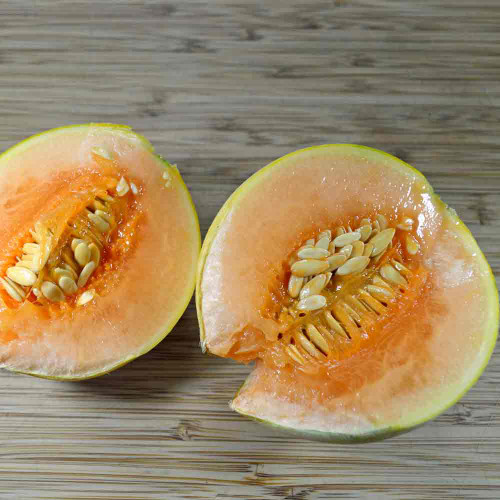Vine Peach / Mango Melon Seeds - (Cucumis melo var.chito)
- SKU:
- V1190
- Seed Count:
- Approx 25 seeds per pack
- Days to Maturity:
- 80-90 days
- Type:
- Chito
- Days to Germination:
- 3-5 days @ 80-90F
- Plant Spacing:
- 12-18"
- Light Preference:
- Full sun
- Soil Requirements:
- Warm soil
- Status:
- Heirloom, Non-Hybrid, Non-GMO seeds
Description
Vine Peach/Mango Melon - Perfumed Aroma of Peaches and Mangoes
A drought-tolerant annual whose fruits are peach-sized and colored, and mango-like in flavor and texture. Often mistaken for their kissing cousins – the inedible Queen Anne’s Pocket Melon – a couple of vine peaches in a bowl will perfume the room with their namesake scent – peaches and mangoes.
Easy to grow, very productive, vigorous, pest-resistant vines.
History
There is some discussion as to how they arrived in America, as William Woys Weaver shows Samuel Wilson, a seedsman in Mechanicsville (Bucks County), Pennsylvania, offered seed in the Farm Journal in February of 1889. Another source shows they were first describe in 1849 by Charles François Antoine Morren, a Belgian botanist and horticulturist, as well as the Director of the Jardin botanique de l’Université de Liège in the early to mid-1800s. He apparently obtained his trial seed from Cuba and brought them to Belgium for study. The vine peach became a well-known commercial variety in Europe soon after, where it might have come to America. Regardless of how vine peach arrived, in the early 20th century it was being commercially grown for pickled foods and preserves.
Uses
While tasty raw, they excel canned or cooked into pies, preserves, conserves and pickles (for pickles, pick while still green).
Growing Tip
Melon seeds dislike cold soil. It's better to wait until the soil is warm to plant the seeds. Melons do not ripen much off the vine so it is important to pick them when they are ready. Ripe melons “slip” from the vine with light pressure.
Learn More
From the soil to the seed to the food you eat - we'll help you grow your best garden!
1 Review
-
Amazing! The BEST smelling thing in the whole garden
Whoever patents a perfume off this melon is going to be rich! These baseball/tennis ball sized melons did so well in the garden I was giving them out to everybody. Everyone who tasted them compared them to a pear or honey taste. I just kept them around for the smell. Truly the history of this melon being used as an air freshener is quite apparent when you grow them. Great in any garden!

















